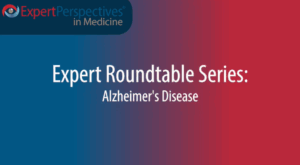Neurology
Alzheimer's Disease
Alzheimer’s Disease Prevention
We know that approximately 45% of all AD cases can potentially be prevented if people adhere to a number of risk reduction strategies. I would add that there is a growing body of evidence pointing to the most important modifiable risk factors for AD and the best factors to improve brain health overall.
<br>
I base my approach to AD prevention on the current literature, and the best article, which first came out in 2017 and has been revised twice (with the latest update in 2024), is The Lancet report on dementia prevention. This report focuses on the most important risk factors for AD. When I meet with patients, I do talk about risk factors that we cannot modify, such as age, sex, family history, and genetics, but I also talk about risk factors that we can modify, including certain cardiovascular risk factors such as high blood pressure, diabetes, and high cholesterol, as well as other risk factors such as hearing and vision impairment, dental health, exercise, diet, sleep quality, and overall activity level. These are some of the most fundamentally important risk factors and ones that everyone can improve. Other important risk factors focus on things such as our attitude toward aging, our purpose in life, whether we have depression, and how well we treat it. These risk factors are not always touched upon in routine medical care, but they may be as important as many of the other risk factors that we focus on.
<br>
I often see a laundry list of recommended lifestyle changes that are given to patients with AD either verbally at the end of an evaluation or in written form. In general, I find that a lot of people do not have the understanding or motivation to make those changes. At my institution, we take a very different approach and have an AD prevention program in which we spend time talking with patients, analyzing their risk factors, educating them, and developing an action plan to which they can make changes. Without that education, discussion, and action plan, the person may not have the knowledge, ability, or motivation to make the type of changes needed.
<br>
In my experience, I find that people are usually open to making changes for both cardiovascular and brain health, addressing hearing loss, and assessing sleep habits. They are often open to—but struggle with—improving their diet and exercise. Finally, people are often surprised to hear—but are very open to—the fact that their attitude, sense of purpose, and overall involvement in social activities can make a big difference in reducing their risk of AD.
<br>
The advent of anti-amyloid immunotherapies has been an important change in our approach to AD prevention and is a good first step. The data show that these immunotherapies can clear amyloid plaques in the brain and slow the course of AD. The real question that remains is: How meaningful is the slowing? And we have yet to fully assess that. Not everyone seems to respond to anti-amyloid immunotherapy to the same degree, and we need to understand why certain patients have this differential response. We also need better metrics to assess improvement. Another important question is: What is the added benefit if we offer these drugs earlier?
<br>
I am confident that, in several decades, we will have effective AD preventive strategies, in terms of both lifestyle and, perhaps, therapeutics that can either prevent the disease entirely or minimize it enough so that people will live out a normal life span with good cognition.
Beshir SA, Hussain N, Menon VB, et al. Advancements and challenges in antiamyloid therapy for Alzheimer’s disease: a comprehensive review. Int J Alzheimers Dis. 2024;2024:2052142. doi:10.1155/2024/2052142
<br>
Kuo CY, Stachiv I, Nikolai T. Association of late life depression, (non-) modifiable risk and protective factors with dementia and Alzheimer’s disease: literature review on current evidences, preventive interventions and possible future trends in prevention and treatment of dementia. Int J Environ Res Public Health. 2020;17(20):7475. doi:10.3390/ijerph17207475
<br>
Livingston G, Huntley J, Liu KY, et al. Dementia prevention, intervention, and care: 2024 report of the Lancet standing Commission. Lancet. 2024;404(10452):572-628. doi:10.1016/S0140-6736(24)01296-0
<br>
Loeffler DA. Modifiable, non-modifiable, and clinical factors associated with progression of Alzheimer’s disease. J Alzheimers Dis. 2021;80(1):1-27. doi:10.3233/JAD-201182
<br>
Rafii MS, Aisen PS. Detection and treatment of Alzheimer’s disease in its preclinical stage. Nat Aging. 2023;3(5):520-531. doi:10.1038/s43587-023-00410-4
<br>
Sáiz-Vázquez O, Gracia-García P, Ubillos-Landa S, et al. Depression as a risk factor for Alzheimer’s disease: a systematic review of longitudinal meta-analyses. J Clin Med. 2021;10(9):1809. doi:10.3390/jcm10091809
<br>
Siebert JS, Wahl HW, Degen C, Schröder J. Attitude toward own aging as a risk factor for cognitive disorder in old age: 12-year evidence from the ILSE study. Psychol Aging. 2018;33(3):461-472. doi:10.1037/pag0000252
<br>
Sutin AR, Luchetti M, Stephan Y, Terracciano A. Purpose in life and cognitive health: a 28-year prospective study. Int Psychogeriatr. 2024;36(10):956-964. doi:10.1017/S1041610224000383











